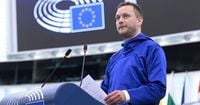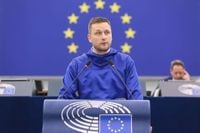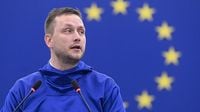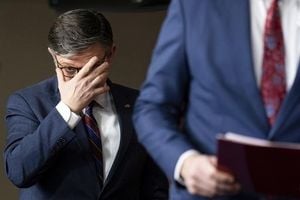On October 8, 2025, Jens-Frederik Nielsen, the 34-year-old Prime Minister of Greenland, made history by addressing the European Parliament in Strasbourg for the first time. Dressed in a blue Inuit anorak that echoed the colors of the European Union flag, Nielsen’s presence was more than symbolic. It marked a pivotal moment in Greenland’s evolving relationship with the EU, as well as its stance amid global power interests swirling around the Arctic island’s strategic resources.
Nielsen opened his speech by acknowledging the European Union as a “stable, reliable, and important partner for more than forty years.” According to the Associated Press, he extended “a heartfelt thank you” to the EU, adding, “You have stood by us as a friend and partner. We will never forget this.” He characterized 2025 as an “eventful if not dramatic year for Greenland,” a sentiment that resonated with lawmakers who greeted his words with a standing ovation.
While Nielsen avoided direct mention of U.S. President Donald Trump’s renewed ambitions to acquire Greenland—a topic that has sent ripples through international politics—he made Greenland’s position crystal clear. As reported by Euronews, when asked about the possibility of Greenland joining the EU or being annexed by the U.S., Nielsen replied, “Let me say this clear, we are not going to join another country. So no, we are not seeking to be a member of the European Union and we are definitely not seeking to be a part of another country.”
Greenland, an autonomous territory within the Kingdom of Denmark since 2009, has a population of roughly 56,000. Its self-government builds on a tradition of home rule dating back to 1979. The territory left the European Economic Community in 1985 after a referendum, but ties with Europe have only grown stronger in recent years. An EU office has even opened in Nuuk, Greenland’s capital, cementing closer cooperation.
At the heart of this relationship is Greenland’s treasure trove of natural resources. The island is home to 24 of the 34 critical minerals identified by the EU as essential for the green transition—think lithium-ion batteries, magnets, and other components vital for renewable energy. Nielsen emphasized, “Our minerals can make a difference for the green transition in the EU.” He also warned, as cited by Euronews, “The critical minerals of Greenland have the potential to shift global and security balances. But action needs to be taken fast.”
To that end, the European Commission has proposed a substantial increase in financial support for Greenland. The next multiannual EU budget (2028–2034) aims to more than double its commitment, from 225 million to 530 million euros, with a focus on developing mineral resources and supporting value chains crucial for the EU’s green economy. European Commissioner Dan Jørgensen and several Members of the European Parliament have visited Greenland in recent weeks, underscoring the urgency and importance of these partnerships.
But minerals are just one piece of the puzzle. Nielsen called on the EU to invest in Greenland’s untapped hydroelectric potential, its airports, and its telecommunications networks—especially in the poorly connected north. “It is essential for us that those who operate telecommunications in Greenland are trusted and reliable actors. This is vital to ensure the stability of the infrastructure, and to prevent unauthorized parties from disrupting and compromising connections,” he stated, as reported by AP.
Fisheries, too, remain a backbone of Greenland’s economy. Under the Sustainable Fisheries Partnership Agreement, EU vessels are allowed to fish in Greenlandic waters in exchange for financial contributions and duty-free access to the EU market for Greenlandic fishery products. Nielsen described the current arrangement as “satisfactory,” but stressed the need for ongoing adjustments to support the growth of Greenland’s fishing industry.
Not all aspects of the EU-Greenland relationship are free from contention. Nielsen used his platform to urge Brussels to reconsider its ban on seal products, a policy he said has “had grave negative impacts on seal hunting and has led to significant drops in the domestic supply as well as in the export of our sealskin.” Seal hunting, he explained, is an integral part of Inuit culture—a “lifeblood of our culture and our identity.” His appeal was clear: “This fishery is part of our culture and our livelihood.”
European Parliament President Roberta Metsola echoed Nielsen’s sentiments, assuring that “Greenland will always find a strong partner in the European Union.” At a press conference, she emphasized the EU’s commitment to supporting Greenland in education, training, and skills, promising that “more support is forthcoming.” Metsola concluded, “When you look to Europe, you will find friends and you will find allies.”
Yet, the shadow of American interest in Greenland looms large. Earlier in 2025, President Trump publicly expressed a desire to add the resource-rich island to the United States, even refusing to rule out military force or economic coercion to achieve that goal. While Nielsen refrained from mentioning Trump’s remarks in his speech, he told reporters that U.S.-Greenland relations should be managed “in mutual respect, with respect for international law.” He added, “We seek to have more and better cooperation also with the USA, when we can fulfill the respectful tone.”
The strategic significance of the Arctic is only intensifying. Global warming is opening new shipping routes and making more land accessible, drawing the attention of superpowers. For example, Critical Metals Corp, with Danish and U.S. backing, established operations at the Qaqortoq mining site in southern Greenland in 2024, pointedly excluding Chinese involvement. The region’s geopolitical intrigue is just beginning, as nations jockey for influence in a rapidly changing Arctic landscape.
Despite these pressures, Nielsen’s message to the European Parliament was one of partnership based on shared values, mutual respect, and practical cooperation. “We need cooperation and partnerships with like-minded countries and institutions who share our values,” he said. The standing ovation he received from lawmakers suggests his words struck a chord—not just as a plea for investment, but as a call for a deeper, more equitable partnership.
As Greenland navigates a year marked by dramatic change, climate challenges, and international attention, its leadership is choosing to strengthen ties with Europe while maintaining its autonomy and cultural heritage. The world’s eyes may be on Greenland’s minerals and strategic position, but for Nielsen and his people, the future depends on partnerships built on trust, respect, and a shared vision for sustainable development.






